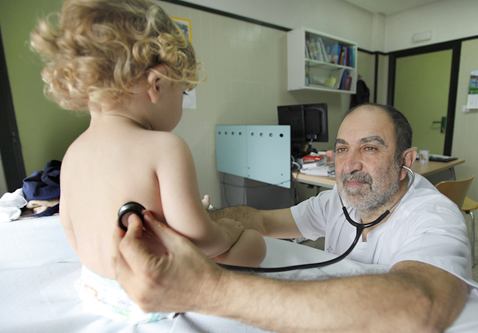In his thesis entitled Excess weight in children: intervention in Primary Paediatric Care, the paediatrician Xabier Txakartegi asserts that the problem of excess weight in childhood is serious because these children have already begun to develop type B diabetes, hypertension and other types of diseases. Over several years Txakartegi measured the Body Mass Index (BMI) of children in the Basque town of Gernika-Lumo and has concluded, among other things, that when certain preventive measures are applied, the level of obesity has not fallen but it has been possible to prevent it from rising. The author of the thesis has admitted that they had expected better results with respect to the effect that breastfeeding could have on excess weight.
An obese child is likely to become an obese adult
The UPV/EHU-University of the Basque Country has analysed the degree of prevalence of obesity among children in Gernika-Lumo and has put forward various preventive measures
- Research
First publication date: 12/01/2016

The paediatrician Xabier Txakartegi has explained that "Paediatric Primary Healthcare groups can influence the slowing down of excess weight, or they can at least prevent the increase in the rate of prevalence. We have taken three different types of measures: ones targeting the whole of society, others targeting schools and those targeting the children, in particular". The paediatrics group in Gernika-Lumo systematically monitored the Body Mass Index (BMI) of the children over a twenty-six-year period and, according to Txakartegi, reached this conclusion: "We haven't spotted any improvement with respect to the prevalence rates of excess weight, but the level of obesity has not in fact increased, unlike in most of the other research. So we haven't solved anything, have we? We haven't achieved any positive results, have we? Yes, we have. We have certainly achieved some results: if we compare the BMI of children in other paediatric groups, in which the measures we have taken have not been implemented, our population of children is healthier in terms of excess weight."
The paediatrics group sent a number of recommendations to the schools in Gernika-Lumo; they included, among other things, a recommendation not to celebrate birthdays and other events in the same way as they had been doing until that point, but in a different way. Various pieces of advice were sent to the families: to have five meals a day, attach greater importance to breakfast, avoid saturated fats and not to have sugary drinks, etc. "They were more or less the preventive measures taken to tackle excess weight," explained Txakartegi.
Breastfeeding did not have the expected results
In general, as the author of the thesis has asserted, the measures proposed did achieve positive results but they also yielded some unexpected results: for example, those connected with breastfeeding. "It was a tremendous disappointment for us. The result was not positive as we had expected it to be. We thought breastfeeding protected children against excess weight but the results obtained did not confirm our assumption. On the contrary, the children who were breastfed for a long period had a higher, statistically significant rate of prevalence of being overweight," pointed out X. Txakartegi.
The researcher confirmed that there are differences between girls and boys: "Regarding excess weight, up to the age of three the level of obesity is similar between them; after the age of three, the BMI rises in girls and then falls until they are ten; after that their BMI rises. In boys, the rise in BMI takes place later (at around the age of six); then it falls until they reach the 10-14 age bracket. In short, in childhood, the boys are more obese, and once this stage has passed, the girls have a higher rate of prevalence with respect to excess weight".
Additional information:
Xabier Txakartegi-Etxebarria (Lekeitio, Bizkaia, Basque Country 1953) works in Primary Paediatric Care of Osakidetza (the public health service in the Basque Autonomous Community), and his thesis entitled Umearen pisu sobera: esku-hartzea Lehen Mailako Arretako Pediatrian (Excess weight in children: intervention in Primary Paediatric Care), is based on anthropometric research in children in Gernika-Lumo. His thesis supervisors were Dr Juan Carlos Vitoria-Cormenzana (head of the Paediatric Gastroenterology Section and professor of Paediatrics) and Dr Juan José Aurrekoetxea-Agirre (Osakidetza inspector and lecturer at the UPV/EHU-University of the Basque Country).







